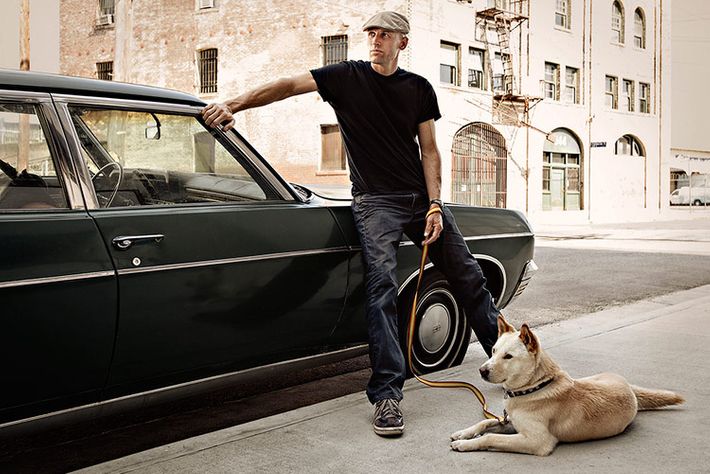
Last week, Lena Dunham revealed the answer to a social-media mystery. What ever happened to Lamby, the rescue dog who was the subject of her Instagrams and a New Yorker essay before he disappeared a few months back? It turns out Lamby had quietly and discreetly checked into a canine rehabilitation center, the Zen Dog, before eventually being re-homed. “There were so many lessons in it, about forgiving myself and loving with an open palm and giving in to a larger plan,” she wrote, without apparent irony.
The Zen Dog takes in dogs whose intense behavioral issues make it hard for them to find homes elsewhere, as a look around its kennels makes clear. Whiteboards hanging on the wall have codes for each dog’s range of problems — there are codes for Escape Artist, for Chewer, for Separation Anxiety, for Poop Eater, and for varying levels of Bite, from “nipped” to “ripped a face off.” Lamby arrived at the facility in terrible shape. “A hot mess, and a train wreck,” said Zen Dog owner and dog trainer Matt Beisner, on the day I visited the space. The dog was heavily medicated, had a nasty temperament, and was drinking his own urine. Now all parties are happy to report that Lamby has stabilized and found a new home with Dani Shay, a former Zen Dog trainer. Like many Brooklyn transplants, Lamby has benefited greatly from the frequent hikes, swims, good weather, and ample space that a Los Angeles life affords.
The Zen Dog is housed in a former electric-parts company in Mission Junction, a sort of industrial no-man’s-neighborhood in L.A. Beisner found the space two years ago and, with an investment from a devoted client, transformed the warehouse into a haven for violent, troubled, and abused dogs. A long-limbed former actor and recovering addict, Beisner carries himself with the serenity of someone used to sitting cross-legged for very long periods of contemplation. His eyes are limpid blue. The sun gleams on the crown of his bald head.
In the decade he’s been working with dogs, Beisner has become known for his unconventional, quasi-Buddhist dog-training philosophy. His clients include Carrie Brownstein (who spoofed the Zen Dog method on an episode of Portlandia); Max Winkler (Henry Winkler’s son, who recommended the Zen Dog to Dunham); comedians like John Mulroney and Jen Statsky; and Scandal’s Katie Lowes, who brought her dog for new-baby integration, and talked about it on Jimmy Kimmel.
“We get a lot of dogs that get kicked out of other day cares,” Beisner tells me. “We tend to them. We’re like the Island of Lost Children. This is our niche. We’ve become the place for owners that don’t have any place to go.”
Technically the Zen Dog is a kennel, but it doesn’t feel like one. During my visit there are about 50 dogs on the premises, but I barely hear or smell them. Save for the occasional bark, it’s a hushed space, and thanks to a poreless, water-resistant floor, the dog odor is nonexistent. (“Important for our mental clarity,” says Beisner.) Beisner leads me through three sunny, Astroturf-ed yards, where dogs run up to the white fences to greet him. “We call these the sanghas,” he says of the outdoor spaces. “It’s Sanskrit for collective conscious.”

In Beisner’s office, five of his nine dogs immediately start the process of getting to know me — sniffing, licking, nosing up my skirt. Beisner reminds me to stay still, stay quiet, let the dogs get used to me, and after 15 seconds of wet noses, my new friends and I settle onto an enormous beige couch that now serves as a giant dog bed.
Kingston, the black terrier who has stretched out beside me, is the first dog Beisner ever trained. Ten years ago, when he was getting clean and living with an ex-girlfriend, her dog Kingston would terrorize him — attacking him, stealing his food. Beisner says it was like living in a bad trip. But he’d been watching a lot of a famous TV show about famous dog trainer — “I don’t even need to say his name, he’s got enough press” (His name rhymes Deaser Dilan) — and figured he could use the tactics he saw on television to train Kingston. It worked. He began working as a dog-care facilitator at an upscale rehab, found private clients, and eventually opened his own in-home boarding business. However, the way he’d trained himself to train dogs was something akin to watching Dr. Oz and setting out to dispense medical advice — Beisner was a hack, he says now. After an alarming incident in which one of his dogs almost killed another (and Beisner himself landed in the hospital), he realized that his methods were inadequate. The answer: Zen Buddhist principles, which he’d begun studying as part of recovery. He would be a Buddhist monk for dogs.
Typical training methods may get a dog to sit, but “just because your dog sits doesn’t mean they respect you,” Beisner explains. “Imagine if every interaction I had with you was an attempt to control you? That’s fucked up.” The relationship with the dog must be founded on respect, on seeing them for who they are, not what owners want them to be, according to the tao of the Zen Dog. This begins with feeling the dog’s energy.
“Every species on the planet communicates through energy,” Beisner says. “So, how do I communicate with dogs who are communicating with energy? Well, first I have to shut the fuck up.” He does not use commands, treats, or punishments, and yet somehow finds that the dogs will do everything he wants them to do. “They were born knowing how to sit, stay, lie down, wait, come. They do that — so why am I trying tell them? It’s like me trying to teach you a language you already speak. It’s insulting. I started to feel and see energy in a way I hadn’t before. Let me show you. This is where it gets Jedi Karate Kid.”
Beisner gets on down on all fours and hovers over Renge (short for the Buddhist mantra Nam-myoho-renge-kyo), his Korean Jindo, who has been calmly napping this whole time. He gazes down at Renge, a beatific smile on his face. He doesn’t touch Renge or say anything; he just gazes. Renge gazes back. His tail starts wagging furiously, his paws curl up in excitement. They lock eyes. They sigh together.
“Now watch what happens if I add sounds and go high-pitched,” says Beisner, describing a non-Zen dog owner’s typical affect. “OOOH I LOVE YOU SO MUCH, OOOOH I LOVE YOU.” Renge leaps up and goes underneath a nearby desk, looking disgusted. “You see?”
Beisner makes house calls in which he teaches owners to apply his method of detachment in basic areas like affection, walking, feeding, and the dreaded front door. Under his instruction, I walk through a typical front-door exercise: I enter the room, and instead of saying “SIT” or immediately petting any of the dogs, I stand calmly and make eye contact with the nearest dog. I can’t take my eyes off him until he sits. I repeat it with another dog. Wordlessly, I somehow manage to get all the dogs to go sit down and stop sniffing my crotch just by making really intense eye contact. It’s magical.
“When you refuse to engage, the dog has to deal with itself,” Beisner explains. “The dog has to problem solve, and create new neural pathways about how to engage. That can happen in one day, it could take three days.”
After sessions like this, owners and dogs go through 14-day ‘the Zen Dog’ detox, after which dogs emerge well behaved and mellow. They also offer day play, dog walking, boarding, training, private sessions, new-baby integration, and grooming services. In-home private sessions are $305 for 2.5 hours, but Beisner says he will never turn a dog away.
Owners like Dunham come to Beisner in various stages of “at the end of their rope.” His hope is that the Zen Dog can help them save themselves. “A lot of them want to be saved,” he says. “But if I saved them it would rob them of the experience to see themselves change along with their dogs. That’s the higher calling.”





